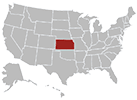
Maybe you are considering becoming an optician in Kansas.
In that case, you should first know what you need to do in order to start your new career.
Page Navigation
Optician Job Description and Duties in Kansas
Opticians are required to make sure that they offer the eye-wear which fits their needs.
Opticians have a variety of tasks to fulfill daily.
Some of these include the following:
- Preparing eyewear
- Fitting and adjusting eyewear
- Educating customers about eyewear issues and maintenance
- Keeping sales records
- Determining insurance co-pays
- Keeping the inventory
- Interacting with the labs that make lenses
However, you do not have to check your clients’ eyes or provide eye-wear prescriptions.
Optician Job Requirements in Kansas
In Kansas, you do not have to meet specific criteria in order to start a new career.
But, if you plan on finding a job fast, you may need an optician license.
A lot of companies want to employ people who took the American Board of Opticians (ABO) exam.
You might be required to take the National Contact Lens Examiner’s (NCLE) exam too.
This exam may be required if you plan on working with contact lenses.
So you can successfully start working, you will need to show:
- A high school diploma or GED
- Graduating from a training program or having a formal education
- An associate’s degree diploma is highly appreciated by employers
- Good interpersonal skills
Optician Education in Kansas
Kansas does not require any specific education, but many post-secondary schools provide optician training programs.
However, there are no such schools in Kansas, though you can find out-of-state or online colleges that have suitable programs.
Remember that you also need to see the requirements of the school you will train in.
You may need to submit:
- A high school diploma or GED
- Completing specific classes with a minimum grade of C
- 2 letters of recommendation
- OAT scores – not older than 5 years
- Minimum GPA of 2.75
The programs for opticians can last up to 4 years, especially if you choose to pursue higher education options.
The subjects you will attend while studying include the following:
- Introduction to Optometry
- Ocular Anatomy
- Systems 1: Neuroscience
- Ocular Microbiology
- Ophthalmic Imaging
- Public Health Optometry
- Glaucoma
- Physics
Optician Certification in Kansas
The optician license is given to students who completed a program.
The licensing body in Kansas is The Kansas State Board of Examiners.
The Board gives licenses to those who meet one of the next criteria:
- A license in a reciprocal state
- At least 3 years of experience
- Can be an apprenticeship of 3 years in the past 6 years
- Can be from working as an optician in a state with no licensing requirements
- Graduate from an approved post-secondary optician program with a year of apprenticeship
Furthermore, you will have to take the National Opticianry Competency Examination (NOCE) through the ABO.
This exam has no less than three difficulty levels:
- Beginner
- Intermediate
- Advanced
The NOCE exam only focuses on spectacles and its subjects are:
- Reading prescriptions,
- Fitting and dispensing spectacles
- Using standard ophthalmic equipment
The exam generally costs around $200, but the fees are covered by the company that hired you.
If you wish to dispense contact lenses you will need to pass yet another exam.
The exam you would have to pass is the National Contact Lens Examiners.
This exam has the same difficulty levels as the ABO.
The cost for this exam is also $200, and the company you work for will usually pay for it.
The exam subjects are:
- Pre-fitting for lenses,
- Diagnostic fitting,
- Dispensing of lenses,
- Patient education,
- Delivery
- Follow-up
The license exams can be taken in English but also Spanish.
You will need to send the paperwork below before taking the exams:
- Age over 18
- A high school diploma or GED
- To fill out an application
- To pay some fees
- A clean criminal record
- Passing the State Practical Examination
- Proof of completed training, education, or at least 3 years of experience
Your optician license will also have to be renewed in Kansas.
You will need to renew it after 2 years have passed.
For this, you also need to take 48 hours of extra education.
Optician Employment and Salary in Kansas
After you get a license, you can work in:
- Stores
- Offices
- Optometry practices
- Hospitals
- Clinics
The average salary for opticians in Kansas is between $38,000 and $49,600.
Annual Salary Range:Average Salary of Opticians in Kansas
| City Name | Salary |
|---|---|
| Wichita | $46,253 |
| Overland Park | $46,983 |
| Kansas City | $47,151 |
| Olathe | $46,855 |
| Topeka | $44,903 |
| Lawrence | $45,615 |
| Shawnee | $46,983 |
| Manhattan | $44,423 |
| Lenexa | $46,983 |
| Salina | $45,772 |
Regional Salary in Kansas
| Region | Employed | Avg. Annual Salary | Avg. Hourly Pay | Top 10% Annual Salary | Bottom 10% Annual Salary |
|---|---|---|---|---|---|
| Topeka, KS | 80 | $38,600 | $18.56 | $46,730 | $34,050 |
| Wichita, KS | 220 | $39,110 | $18.80 | $45,760 | $32,150 |
* Employment conditions in your area may vary.
Additional Information for Opticians in Kansas
Perhaps you need additional resources, in which case check out the following:
- Kansas Optical Society
- Kansas Optometric Association
- Kansas State Board of Examiners in Optometry
- National Board of Examiners in Optometry (NBEO)
- Opticians Association of Kansas
- ABO




